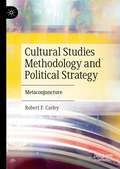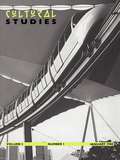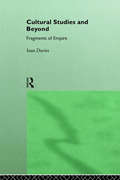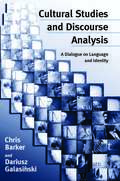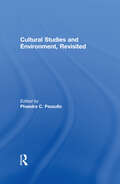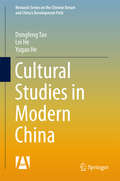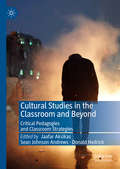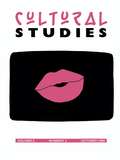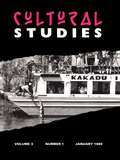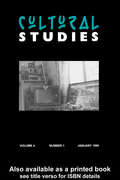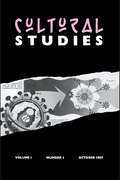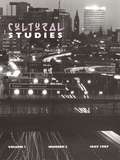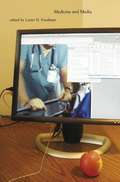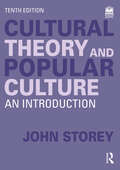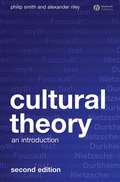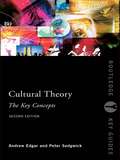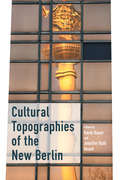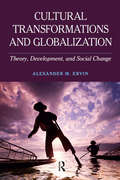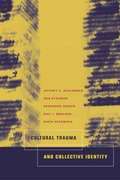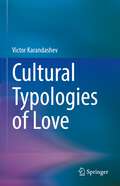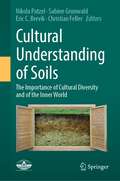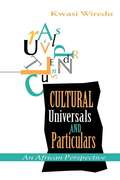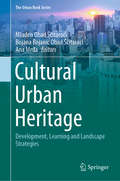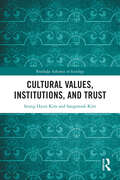- Table View
- List View
Cultural Studies Methodology and Political Strategy: Metaconjuncture
by Robert F. CarleyThis book is an intervention into cultural studies' theoretical and methodological foundations. It addresses a crisis in conjunctural analysis: that there is no theorized method for conjunctural analysis as it pertains to recognizing a conjunctural shift or the emergence of an organic crisis. This crisis is connected to the belief that the definition of the conjuncture is ambiguous in Gramsci’s work, but using a broader range of primary, secondary, and also untranslated sources on the conjuncture, Carley demonstrates that Gramsci has decisively settled that ambiguity. Through a philological approach to Gramsci’s original texts, this book alters the debate around conjunctural analysis and offers means to reinterpret cultural studies and its relationship to its founding thinkers.
Cultural Studies V2 Issue 1: Volume 4, Issue 1
by John FiskeFirst published in 1988. Routledge is an imprint of Taylor & Francis, an informa company.
Cultural Studies and Beyond: Fragments of Empire
by Ioan DaviesThis lively book will be essential to all those attempting to understand the state of Cultural Studies in the West today. Ion Davies, who was in at the birth of Cultural Studies in Britain and followed its development in many parts of the world, is uniquely qualified to add historical depth and comparative breadth to this subject. Introducing the central theoretical issues, as well as the key personalities, Cultural Studies and Beyond traces the origins, growth and diffusion of the subject.
Cultural Studies and Discourse Analysis: A Dialogue on Language and Identity (Cultural Studies)
by Chris Barker Dariusz Galasi SkiThis novel and important book brings together insights from cultural studies and critical discourse analysis to examine the fruitful links between the two. Cultural Studies and Discourse Analysis shows that critical discourse analysis is able to provide the analytic context, skills and tools by which we can study how language constructs, constitutes and shapes the social world and demonstrates in detail how the methodological approach of critical discourse analysis can enhance cultural studies. In a richly argued discussion, the authors show how marrying the methodology of critical discourse analysis with cultural studies enlarges our understanding of gender and ethnicity.
Cultural Studies and Environment, Revisited
by Phaedra C. PezzulloThe environment is perhaps most misunderstood as a static place, somewhere "out there," separated from the practices of our everyday lives. Given this assumption, environmental movements and concerns have remained mostly marginalized or denigrated in cultural studies publications, conferences, and presentations. Recent global developments have made changing this oversight and, at times, direct resistance to engaging environmental concerns a new priority. This edited collection illustrates an appreciation of the dynamic, palpable, and significant ways the environment permeates culture (and vice versa), as well as a collective commitment to the ways that cultural studies has more to offer—and to learn from—taking environmental matters to heart. Like foundational categories of identity, economics, and historical context, this collection reminds us why the environment is and should be considered relevant to any work done in the name of "cultural studies." Including research from four continents and across media, the authors offer insights on timely topics such as food, tourism, human/animal relations, forests, queer theory, indigenous rights, and water. This book was published as a special issue of Cultural Studies.
Cultural Studies in Modern China (Research Series on the Chinese Dream and China’s Development Path)
by Dongfeng Tao Lei He Yugao HeAs the first book to introduce and analyze cultural studies in contemporary China, this volume is an important resource for Western scholars wishing to understand the rise and development of cultural studies in China. Organized according to subject, it includes extensive material examining the relationships between culture and politics, as well as culture and institutions in contemporary China. Further, it discusses the development of cultural debates.
Cultural Studies in the Classroom and Beyond: Critical Pedagogies and Classroom Strategies
by Jaafar Aksikas Sean Johnson Andrews Donald HedrickThis edited volume seeks to combine and highlight the theoretical and practical aspects of teaching by exploring and reflecting on the ways in which Cultural Studies is taught and practiced at both the undergraduate and graduate levels, in the US and internationally. Contributors create a space where connections among Cultural Studies practitioners across generations and locations are formed. Because the alliances built by Cultural Studies practitioners in the U.S. and the global north are deeply shaped by the global south/Third World perspectives, this book extends an invitation to teachers and practitioners in and outside of the US, including those who may offer a transnational perspective on teaching and practicing Cultural Studies. This volume promises to be a trailblazing collection of first-rate essays by leading and emerging figures in the field of Cultural Studies.
Cultural Studies: Environmental Educators Dancing Away From Mechanism (Transgressions: Cultural Studies And Education Ser. #Vol. 30)
by James DonaldFirst Published in 1987. Routledge is an imprint of Taylor & Francis, an informa company.
Cultural Studies: Volume 3 No. 3
by John FiskeFirst Published in 1990. Routledge is an imprint of Taylor & Francis, an informa company.
Cultural Studies: Volume 3, Issue 1
by John FiskeThis book should be of interest to general readers as well as students of cultural studies and communication.
Cultural Studies: Volume 4, Issue 1
by John FiskeThis book should be of interest to general, as well as students of cultural studies and communication.
Cultural Studies: Volume 4, Issue 1
by John FiskeFirst Published in 1987. Routledge is an imprint of Taylor & Francis, an informa company.
Cultural Studies: Volume 4, Issue 1
by John FiskeFirst published in 1987. Routledge is an imprint of Taylor & Francis, an informa company.
Cultural Sutures: Medicine and Media
by Lester D. FriedmanMedicine and the media exist in a unique symbiosis. Increasingly, health-care consumers turn to media sources--from news reports to Web sites to tv shows--for information about diseases, treatments, pharmacology, and important health issues. And just as the media scour the medical terrain for news stories and plot lines, those in the health-care industry use the media to publicize legitimate stories and advance particular agendas. The essays in Cultural Sutures delineate this deeply collaborative process by scrutinizing a broad range of interconnections between medicine and the media in print journalism, advertisements, fiction films, television shows, documentaries, and computer technology. In this volume, scholars of cinema studies, philosophy, English, sociology, health-care education, women's studies, bioethics, and other fields demonstrate how the world of medicine engages and permeates the media that surround us. Whether examining the press coverage of the Jack Kevorkian-euthanasia controversy; pondering questions about accessibility, accountability, and professionalism raised by such films as Awakenings, The Doctor, and Lorenzo's Oil; analyzing the depiction of doctors, patients, and medicine on E. R. and Chicago Hope; or considering the ways in which digital technologies have redefined the medical body, these essays are consistently illuminating and provocative. Contributors. Arthur Caplan, Tod Chambers, Stephanie Clark-Brown, Marc R. Cohen, Kelly A. Cole, Lucy Fischer, Lester D. Friedman, Joy V. Fuqua, Sander L. Gilman, Norbert Goldfield, Joel Howell, Therese Jones, Timothy Lenoir, Gregory Makoul, Marilyn Chandler McEntyre, Faith McLellan, Jonathan M. Metzl, Christie Milliken, Martin F. Norden, Kirsten Ostherr, Limor Peer, Audrey Shafer, Joseph Turow, Greg VandeKieft, Otto F. Wahl
Cultural Theory and Popular Culture: An Introduction
by John StoreyIn this tenth edition of his award-winning introduction, John Storey presents a clear and critical survey of competing theories of, and various approaches to, popular culture. Its breadth and theoretical unity, exemplified through popular culture, means that it can be flexibly and relevantly applied across a number of disciplines.Retaining the accessible approach of previous editions and using appropriate examples from the texts and practices of popular culture, this new edition remains a key introduction to the area.New to this edition: updated throughout with contemporary examples of popular culture a chapter called 'Culture and nature', which includes sections on culture in nature, the Anthropocene, the Capitalocene, and popular culture and climate change updated student resources at routledgelearning.com/culturaltheoryandpopularculture This new edition remains essential reading for undergraduate and postgraduate students of cultural studies, media studies, communication studies, the sociology of culture, popular culture and other related subjects.
Cultural Theory: An Introduction (21st Century Sociology Ser. #Vol. 1)
by Philip Smith Alexander RileyThis second edition of Cultural Theory provides a concise introduction to cultural theory, placing major figures, traditional concepts, and contemporary themes within a sharp conceptual framework. Provides a student-friendly introduction to what can often be a complex field of study Updates the first edition in response to reader feedback and to the changing nature of the field Includes additional coverage of theorists from the classical period to include Nietzsche and DuBois Introduces entirely new chapters on race and gender theory, and the body Considers themes that have become more important in theoretical activity in recent years such as computers and virtual reality, cosmopolitanism, and performance theory Draws on theories and theorists from continental Europe as well as the English-speaking world
Cultural Theory: The Key Concepts (Routledge Key Guides)
by Peter Sedgwick Andrew EdgarNow in its second edition, Cultural Theory: The Key Concepts is an up-to-date and comprehensive survey of over 350 of the key terms central to cultural theory today. This second edition includes new entries on: colonialism cybercultur globalisation terrorism visual studies. Providing clear and succinct introductions to a wide range of subjects, from feminism to postmodernism, Cultural Theory: The Key Concepts continues to be an essential resource for students of literature, sociology, philosophy and media and anyone wrestling with contemporary cultural theory.
Cultural Topographies of the New Berlin
by Karin Bauer Jennifer Ruth HosekSince Unification and the end of the Cold War, Berlin has witnessed a series of uncommonly intense social, political, and cultural transformations. While positioning itself as a creative center populated by young and cosmopolitan global citizens, the “New Berlin” is at the same time a rich site of historical memory, defined inescapably by its past even as it articulates German and European hopes for the future. Cultural Topographies of the New Berlin presents a fascinating cross-section of life in Germany’s largest city, revealing the complex ways in which globalization, ethnicity, economics, memory, and national identity inflect how its urban spaces are inhabited and depicted.
Cultural Transformations and Globalization: Theory, Development, and Social Change
by Alexander M ErvinChange is the most significant factor of contemporary society and humanity s past. This book represents the first substantial attempt since the 1970s to synthesize and critique sociocultural change theories in anthropology and relate them to trends in the social and physical sciences. It emphasizes the most recent contributions especially complexity and emergence theory, social movements, network analysis, and globalization. Ervin presents a rich legacy of theories and case studies accessible to both the established scholar and the beginning student. He considers how theories and insights can inform policy as humanity faces crises of globalization.Key Features of the Text Designed for scholars and students seeking a comprehensive analysis of the relation between anthropological theory and practice. Assesses big questions facing the social sciences: Do cultures and societies change or is it really individuals, families, and social networks? Are there prime movers of change environment, technology, economics, ideas, powerful leaders, or cultural contacts? Are there structures embedded within changes and changes built into structures? Original contribution of the book is the integration of sociological and anthropological theories, including networks, social movements, complexity, world systems, etc. Online appendices include resources for students on applied and practice anthropology."
Cultural Trauma and Collective Identity
by Neil J. Smelser Jeffrey C. Alexander Ron Eyerman Bernard Giesen Piotr SztompkaIn this collaboratively authored work, five distinguished sociologists develop an ambitious theoretical model of "cultural trauma"--and on this basis build a new understanding of how social groups interact with emotion to create new and binding understandings of social responsibility. Looking at the "meaning making process" as an open-ended social dialogue in which strikingly different social narratives vie for influence, they outline a strongly constructivist approach to trauma and apply this theoretical model in a series of extensive case studies, including the Nazi Holocaust, slavery in the United States, and September 11, 2001.
Cultural Typologies of Love
by Victor KarandashevThis timely volume offers an integrative approach and a culturally diverse view of love conceptions, experiences, and expressions, building on both individual and cultural typologies of love. It comprehensively presents cultural and cross-cultural studies on how culture affects love, and offers a systematic description of types and cultural models of love. The comprehensive reviews of methodology and findings provide a solid empirical basis for the creation of formal typologies. This book will be useful for researchers interested in cross-cultural studies of love across many disciplines. Its accessible language also makes it ideal for undergraduate and graduate students. Readers will gain a comprehensive understanding of: Cultural conceptions of love and methods for their research Multiple perspectives in the studies of love across world cultures Cultural models and typologies in an international perspectiveCultural models and typologies from an interdisciplinary scientific perspective
Cultural Understanding of Soils: The importance of cultural diversity and of the inner world
by Christian Feller Sabine Grunwald Eric C. Brevik Nikola PatzelCultural understandings of soil are diverse and often ambiguous. Cultural framing of soils is common worldwide and is highly consequential. The implications of what place the earth has in people's world view and everyday life can be in line with or in conflict with natural conditions, with scientific views, or with agricultural practices. The main assumption underlying this work is that soil is inescapably perceived in a cultural context by any human. This gives emergence to different significant webs of meaning influenced by religious, spiritual, or secular myths, and by a wide range of beliefs, values and ideas that people hold in all societies. These patterns and their dynamics inform the human-soil relationship and how soils are cared for, protected, or degraded.Therefore, there is need to deal inter-culturally with different sources and types of knowledge and experience regarding soil; a need to cultivate soil awareness and situationally appropriate care through inter- and intra-cultural dialogues and learning. This project focuses on the human and intangible dimensions of soil.To serve this aim, the International Union of Soil Sciences (IUSS) founded a working group on Cultural Patterns of Soil Understanding that has resulted in this book, which presents studies from almost all continents, written by soil scientists and experts from other disciplines. A major objective of this project is to promote intercultural literacy that gives readers the opportunity to appreciate soil across disciplinary and cultural boundaries in an increasingly globalized world. . .
Cultural Universals and Particulars: An African Perspective
by Kwasi WireduMasolo Ghanaian philosopher Kwasi Wiredu confronts the paradox that while Western cultures recoil from claims of universality, previously colonized peoples, seeking to redefine their identities, insist on cultural particularities. Wiredu asserts that universals, rightly conceived on the basis of our common biological identity, are not incompatible with cultural particularities and, in fact, are what make intercultural communication possible. Drawing on aspects of Akan thought that appear to diverge from Western conceptions in the areas of ethics and metaphysics, Wiredu calls for a just reappraisal of these disparities, free of thought patterns corrupted by a colonial mentality. Wiredu's exposition of the principles of African traditional philosophy is not purely theoretical; he shows how certain aspects of African political thought may be applied to the practical resolution of some of Africa's most pressing problems.
Cultural Urban Heritage: Development, Learning and Landscape Strategies (The Urban Book Series)
by Mladen Obad Šćitaroci Bojana Bojanić Obad Šćitaroci Ana MrđaThis book presents strategies and models for cultural heritage enhancement from a multidisciplinary perspective. It discusses identifying historical, current and possible future models for the revival and enhancement of cultural heritage, taking into consideration three factors – respect for the inherited, contemporary and sustainable future development. The goal of the research is to contribute to the enhancement of past cultural heritage renovation and enhancement methods, improve the methods of spatial protection of heritage and contribute to the development of the local community through the use of cultural, and in particular, architectural heritage. Cultural heritage is perceived primarily through conservation, but that comes with limitations. If heritage is perceived and experienced solely through conservation, it becomes a static object. It needs to be made an active subject, which implies life in heritage as well as new purposes and new life for abandoned heritage. Heritage can be considered as a resource that generates revenue for itself and for the sustainability of the local community. To achieve this, it should be developed in accordance with contemporary needs and technological achievements, but on scientifically based and professional criteria and on sustainable models. The research presented in this book is based on the approach of Heritage Urbanism in a combination of experiments (case studies) and theory.
Cultural Values, Institutions, and Trust (Routledge Advances in Sociology)
by Sangmook Kim Seung Hyun KimUsing experimental surveys as a primary source, Kim and Kim compare a wide range of developed countries to assess the determinants of generalized social trust. With data from Belgium, France, Italy, Japan, Singapore, South Korea, the Netherlands, and the United States, Kim and Kim present a detailed picture of trust at the individual level, across different ethnic groups, and across different regions with economic and cultural distinctions. They focus on a range of concepts, including generalized trust and familism; causal relationships among cultural values, particularized trust, and institutional trust at the individual level; and relationships between culture, wealth, and governance at the macro-level. In doing so, they consolidate substantial quantitative data with rigorous theoretical analysis and advance our understanding of social trust and prosociality in general. A valuable resource for researchers and advanced students in political science, sociology, and social psychology around the world.
